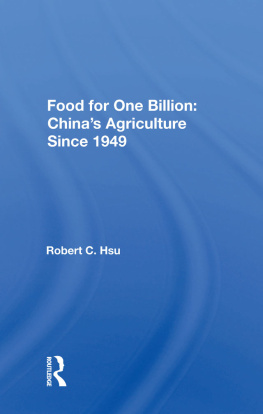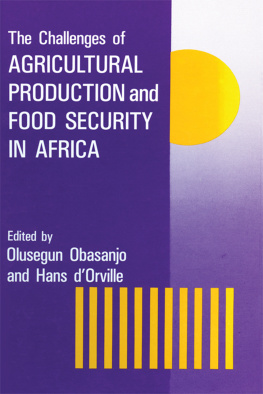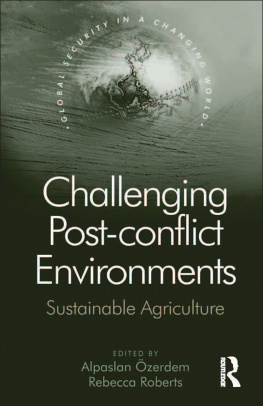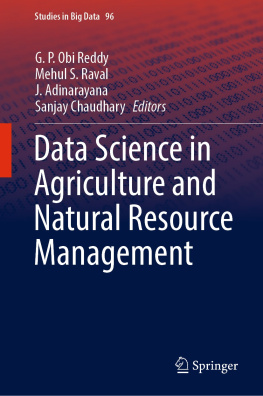GREEK AGRICULTURE IN A CHANGING INTERNATIONAL ENVIRONMENT
Greek Agriculture in a Changing International Environment
DIMITRIS DAMIANOS
EFTHALIA DIMARA
KATHARINA HASSAPOYANNES
DIMITRIS SKURAS
First published 1998 by Ashgate Publishing
Reissued 2018 by Routledge
2 Park Square, Milton Park, Abingdon, Oxon OX14 4RN
711 Third Avenue, New York, NY 10017, USA
Routledge is an imprint of the Taylor & Francis Group, an informa business
Copyright D. Damianos, E. Dimara, K. Hassapoyannes, D. Skuras 1998
All rights reserved. No part of this book may be reprinted or reproduced or utilised in any form or by any electronic, mechanical, or other means, now known or hereafter invented, including photocopying and recording, or in any information storage or retrieval system, without permission in writing from the publishers.
Notice:
Product or corporate names may be trademarks or registered trademarks, and are used only for identification and explanation without intent to infringe.
Publishers Note
The publisher has gone to great lengths to ensure the quality of this reprint but points out that some imperfections in the original copies may be apparent.
Disclaimer
The publisher has made every effort to trace copyright holders and welcomes correspondence from those they have been unable to contact.
A Library of Congress record exists under LC control number: 98073757
ISBN 13: 978-1-138-31919-6 (hbk)
ISBN 13: 978-0-429-45405-9 (ebk)
Contents
This book is important for a number of reasons, and the English-reading world will gain from it. The most significant reason is that Greece is now a member of the EU, having joined in 1981. Adding Spain and Portugal to the Union in the round of enlargement that followed, in 1986, brought total Mediterranean membership of the EU to four member states (without including France which is at least partly Mediterranean). The four Mediterranean members now account for 43 per cent of crops, 37 per cent of grass, 25 per cent of woods in their one third of the EU agricultural area (Stanners and Bourdeau, 1995), and for one sixth of [EU] Mediterranean holdings. The average size of land holdings in Greece, which is slightly larger than 4 hectares, just under half of the groups average, emphasises the countrys acute problems relating to rural development.
Its present position as a significant participant in European agricultural trade, as custodian of a substantial European heritage, as a member of the European Union and with its agriculture playing an important role in the Greek economy further adds to its significance.
As the book brings out with clarity, the world economy is now globalised and it is therefore becoming ever more vital to know about all parts of this vast network if any single state, or even group of states, is to participate in it effectively. Greek agriculture contributes a substantial share of national GDP and of exports. There are thus many parties who will need to know more about the economic shape of its agriculture in constructing and managing their own trade, agricultural and economic policies. For Greece to find its appropriate place, in the EU and the world, it will have to negotiate with many other states who will be more easily persuaded the better informed they are. Greece will, along with all other states, face a series of extended agricultural negotiations over the coming decade which will determine its contribution to the world trade well into the new century. Many participants in those discussions will need to know about Mediterranean agriculture, its problems and potentials, in some detail as the talks proceed. Beyond that immediate requirement a number of other issues will become contentious elements on the world policy agenda.
The Mediterranean itself is a virtually closed sea with which a number of other states have a frontier. Each of them is likely to lose from mismanagement of Greek agriculture and to gain as it approaches more sustainable development. Wider still, there are many recognised environmental pollutants to which Greek agriculture may add or from which it may subtract over coming decades, depending upon its developmental path. For example, fertilisers used in Greek agriculture, as in other parts of the world economy, cause soil degradation and pollution of water resources. There is potential for reducing environmentally hazardous effects by using sensible land use policies, policies which are more likely to be promoted from a better informed administration both in Athens and in Brussells.
Finally, Mediterranean states have many problems in common, a major one of which is how to modernise their agricultural sectors within the constraints of sustainable rural development. Whilst no state has the single key to these problems, all can learn from the policies pursued by others and for that reason this book will be of value.
With such an array of issues and problems bearing on the agriculture of EU member states, it is a pleasure to welcome a well constructed analysis of the position of Greek agriculture, its problems and prospects in a dynamic world economy.
Martin Whitby
Emeritus Professor of Countryside Management
The University of Newcastle upon Tyne
Reference
Stanners, D. and Bourdeau, P. (1995), Europes Environment: the Dobris Assessment: Statistical Assessment Earthscan
This book aims at identifying the scope of actions that need to be undertaken in order for Greek agriculture to survive the pressures from an increasingly competitive world. Two facts underscore this need. First, agriculture constitutes an important sector not only to Greeces economy, but also to the countrys socio-cultural structure. Second, a series of international developments lead to several changes: to trade liberalization, to the expansion of existing markets and to the emergence of new ones, to improved market access, to changes in consumer priorities and to the awareness of environmental issues. In the meantime, the growth in information and communications systems amplify the impact that movements toward international economic integration have on economic and environmental sectors of various countries. Given these circumstances, the Greek agricultural sector and the related institutions should undergo major transformation. Well coordinated and concerted actions in various directions have to be undertaken in order for agriculture to contribute to the socio-economic well being of the countryside, consumers, and producers alike. The sector has to redefine its role regarding nature and small-scale family holdings, public health and the environment, rural development and the grass-roots approach, marketing and third country markets. The challenge is that these goals should be achieved under a system of reduced price support and no export subsidies.
In the 1980s, worldwide tensions in agricultural markets brought attention to the distortions that domestic agricultural policies of industrialized countries effect onto the world markets. Whether the result of realization of the world market distortions or of increasing budgetary pressures and of accumulating structural surpluses stemming from the continuation of price support policies in several industrialized states, a tendency toward trade liberalization and a switch to more competitive world markets of agricultural products began to be formed. The international environment was ready to consider the reform of agricultural policies.








